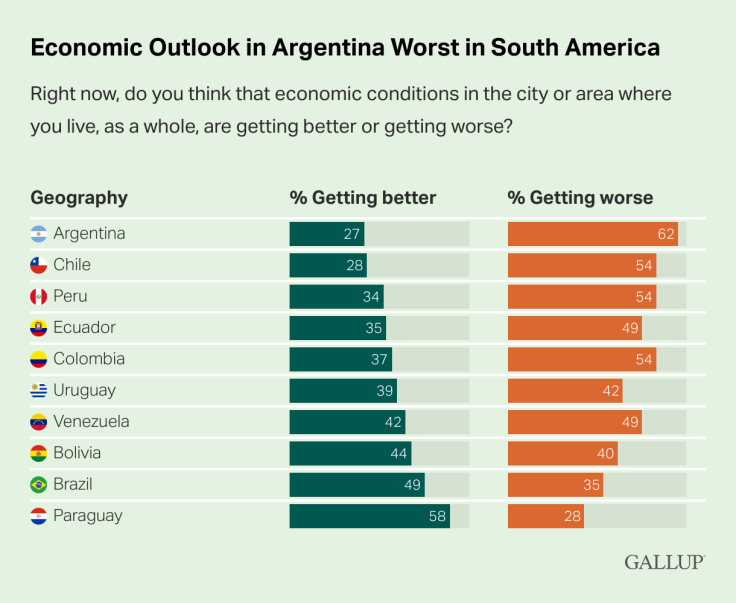
As the Argentine presidential elections loom, a new Gallup poll regarding the population's perception of key economic and social issues helps paint a picture about the context in which they will head to the polls on Sunday.
Historic disillusionment with the government, a negative economic outlook and a generalized struggle to afford shelter might play a role at the time of casting the ballot, which could lead to a sharp shift to the right in the form of libertarian Javier Milei.
When it comes to the first issue, Gallup's poll shows that confidence in the government of Alberto Fernandez is at only 28%. Last year it reached a low of 26%, the third lowest in South America and, given the widespread discontent with the administration, Fernandez will not stand for reelection. The baton has been taken by Economy Minister Sergio Massa, who currently leads the Peronist coalition now called Union por la Patria.
Massa, considered more centrist than the core of the party, came out third in August's primary elections, widely considered to be a nation-wide poll as most parties have already decided who their candidate will be. Concretely, Union por la Patria got 27.28 of the votes when combining his votes and those of Juan Grabois, a left-wing contender who didn't pose an actual threat to his candidacy.
Massa will likely seek to defeat opposition leader Patricia Bullrich, candidate for Juntos por el Cambio coalition, who came in second. She defeated Horacio Rodriguez Larreta in a more contested primary, both of them getting a combined 28% of the votes.
Who ends up in second place seems to be the main question, as Milei seems to have gained momentum since shocking the nation by receiving an unexpected 30% of the ballots in August. According to most polls, he will retain the lead and his hopes are put in taking the victory in the first round. That will happen either by getting at least 40% of the votes with a 10-point margin over the runner-up or 45% of the vote overall.
"Riding a wave of general dissatisfaction with the ruling classes, Milei's policy platform involves dollarizing the economy and slashing the state by cutting free access to healthcare and education. He has also floated controversial ideas such as legalizing the sale of human organs. Former Brazilian President Jair Bolsonaro has endorsed Milei," reads Gallup's description of Milei.
The second issue highlighted by the poll is widespread dissatisfaction with the economy and the perspective that things are not heading in the right direction. With inflation running comfortably above 100%, a spiraling depreciation of the peso and higher levels of poverty, Argentines are the most pessimistic regarding the economic outlook in South America: 27% said it was getting better and 62% that it was getting worse.

As for the housing situation, Gallup claims the following: "Inability to afford shelter tells a similar story, tying its previous high of 29%. Rampant inflation and its associated squeeze on incomes are affecting everyone: While 43% of those in the poorest 20% income group struggled to afford shelter at times in the past year, so did a record-high 22% of the richest 20% in Argentina".
These figures could help explain the rise of an outsider like Milei, who has made of destroying the "political caste" the center of his campaign. However, while he has also put the size of the state and public services in line, "promising to abolish tuition-free public education and disband free access to healthcare," a majority of Argentines continue to be satisfied with services such as public healthcare. "Satisfaction with Argentina's education system is also high at 60%, rising to 70% among Argentines with the lowest level of education (completed elementary school, at most)," reads the poll.
Other controversial aspect is Milei's disregard for climate change. He has called it a "socialist lie" and claimed changes in global temperatures are not human-driven but a natural cycle of the world. In contrast, in 2021, the vast majority of adults in Argentina (83%) felt that climate change is a serious threat to the country in the next 20 years (with 61% saying it is a "very serious" threat), according to the Lloyd's Register Foundation World Risk Poll.
Whether these issues have an impact will be determined on Sunday or, at most, November 19, when a second round would take place.
© 2025 Latin Times. All rights reserved. Do not reproduce without permission.





